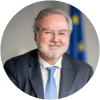TechSonar 2022-2023, in an increased complex world

It was at the end September 2021 when the EDPS first launched its first foresight-related project, TechSonar. At that moment, we already believed the world to be a highly -complex place. Yet from September 2021 onwards, we stood by and watched in disbelief the events that unfolded at the eastern border of the European Union, which threatened the very core of our European democracy and values. Today, one thing is certain: new challenges will not cease to emerge.


